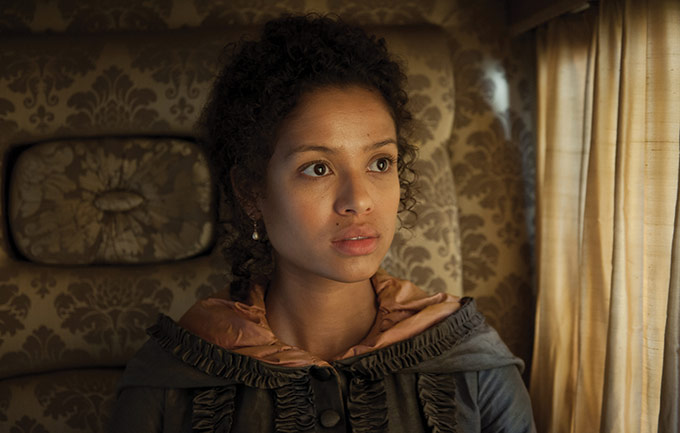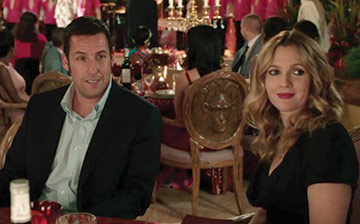Next story: On The Boards Theater Listings
Belle, Blended, Chef
by M. Faust

Tell Me a Story
Genteel audiences who would have liked to see 12 Years a Slave if only it were more along the lines of Downton Abbey are the presumed demographic for Belle, a movie that deals with slavery by never depicting it.
Our heroine is Dido Elizabeth Belle, born in 1761 as the daughter of a British admiral and a slave woman. (She actually existed, through the film is largely fictitious.) Her father openly acknowledges her but is unable to raise her (a sailor’s life, you know) so the child is put in the care of her great-uncle William Murray, 1st Earl of Mansfield (Tom Wilkinson), who accepts her after some harrumphing about “propriety” because she is, in the end, a blood relative.
Dido is raised as the equal of her cousin Elizabeth, with a few exceptions, like not being able to eat at the dinner table. “How,” she asks with some confusion, “can I be too high in rank to dine with the servants but too low to dine with guests?” Her life becomes even more of a Groucho Marx-ish paradox when she gets older: despite a respectable inheritance from her dead father, she is presumed never to marry because no “gentleman” would want her, and anyone claiming to would obviously only be after her money.
Stuff like this is great fodder for satire, and screenwriter Misan Sagay doesn’t confine herself to racism. She takes aim at the entire British class system, which on this level makes it impossible to consort with anyone not judged to be your “equal”: life is equally vexing if you have a title but no money as the other way around. It’s hard to negotiate your way in a world where having a vicar for a father and painting your house teal are treated with equal amounts of derision.
But Belle isn’t going for humor. (At least not intentionally: it’s hard to tell whether lines like “Good lord, it’s a Negro!” are meant to be funny or just play that way. Though intentional or not, I defy you to keep a straight face when a potential suitor is instructed by his mother that “You will refrain from any intercourse with the Negro.”)
Aside from the injustice of her own existence, Dido is involved with the notorious case of the Zong massacre, in which the owners of a slave ship threw 142 diseased slaves overboard, still chained together, and filed an insurance claim for “damaged cargo.” And guess who the Chief Magistrate hearing the case’s appeal is? None other than great-uncle William, one of those types who feels constrained to enforce rather than interpret the law.
The Zong incident actually happened, and it’s a valuable history lesson. The insurance claim was defended, at least in part, on the notion that the slave trade should not be disrupted because it was too valuable to Britain, and if you can’t connect that to any current events you need a better news source. And you can certainly find current applications for Mansfield’s ruling that “Laws that allow us to diminish the humanity of others are not laws, they are frameworks for crimes.”
Still, given the inevitability of the outcome the issues are approached like shooting fish in a barrel. Similarly it’s hard to feel as bad as we might for Dido when she is not only cultured and intelligent but drop-dead gorgeous. Actess Gugu Mbatha-Raw is perhaps not so much talented as she is beautiful, though it’s hard to judge given that her character has to bear all the weight of England’s racism on her slender shoulders. And a scene that requires her to look in the mirror and slap herself, as if to tear away the skin that is the cause of all her grief (or so I imagine the script reading) is, to be fair, beyond any performer.
Whatever its limitations, Belle does what we expect a mainstream movie to do: it holds our interest with a story. That sounds obvious, but story increasingly seems to be something filmmakers don’t think they need to worry about with if they have enough other saleable elements. Take Blended and Chef, two often likeable but generally frustrating comedies opening this weekend.
As an Adam Sandler vehicle, I ordinarily wouldn’t even bother with Blended, but it co-stars Drew Barrymore, with who he made his two most engaging movies, The Wedding Singer and 50 First Dates. They’re an onscreen team with chemistry, each bringing out the best in each other, and that’s a valuable asset, something you would presume would be saved for a script that can make proper use of it.
I guess they got tired of waiting for one. The duo play single parents—she’s divorced, he’s a widower—who meet and fail to connect on a blind date. Mutally happy at the thought of never seeing each other again, they instead find themselves (though acceptably plausible circumstances) themselves sharing an all-expenses paid vacation at a resort in South Africa with their kids (his three daughters, her two sons).
There’s no mystery where this is going: they will grate on each other, familiarity will breed contentment, they kiss, the end. Problem is, the script isn’t much more developed than that. The kids benefit from being with an alternate adult, and there are speeches about the importance of parenting, but so little actually happens on this vacation that we get a tacked-on last minute conflict to make it feel like the movie has earned its happy ending. Sandler and Barrymore are still an appealing couple, but there’s no tension to involve us with them. Blended is better than your standard Sandler vehicle, but to call a movie an improvement on Grown-Ups 2, That’s My Boy or Jack and Jill really isn’t saying much.
By far the better movie, Chef is Jon Favreau’s attempt to show that, despite having reached the top tier of Hollywood directors with blockbuster like Cowboys and Aliens and the Iron Man movies, he is at heart still the same indie filmmaker he was 20 years ago. He wrote, produced, directed and stars as Carl Casper, head chef at a successful LA restaurant. His career takes a nosedive when he gets into a public feud with a restaurant critic, leading him to go on the road with a food truck selling Cuban cuisine.
Foodies hear all the time about successful chefs who are giving up the lucrative but ossified world of luxury restaurants to work in small venues where they get to experiment and mingle with the people they’re feeding. And Chef lavishes on the food porn: you’d better eat before the movie, because you’re going to get awfully hungry if you see this on anything less than a full stomach.
But once Carl gets his truck up and running (all in the space of one miraculous day), the movie is essentially over. Aside from a lot of scenes of him bonding with his ten-year-old son, there’s no more story. Even the truck, engine of his revitalization, is jettisoned in a tacked-on happy ending that seems to have been added by an entirely different writer.
It’s funny, it’s nice to look at so much good food, and Favreau got a fistful of friends to appear in it—John Leguizamo, Bobby Cannavale, Scarlett Johansson, Dustin Hoffman, Sofía Vergara, Oliver Platt, Amy Sedaris, Robert Downey Jr. But it lacks conviction: Carl ends up back in a position as comfortable as that of a Hollywood A list director with a lucrative new contract in his back pocket.
|
Issue Navigation> Issue Index > v13n21 (Week of Thursday, May 22) > Belle, Blended, Chef This Week's Issue • Artvoice Daily • Artvoice TV • Events Calendar • Classifieds |











 Current Issue
Current Issue